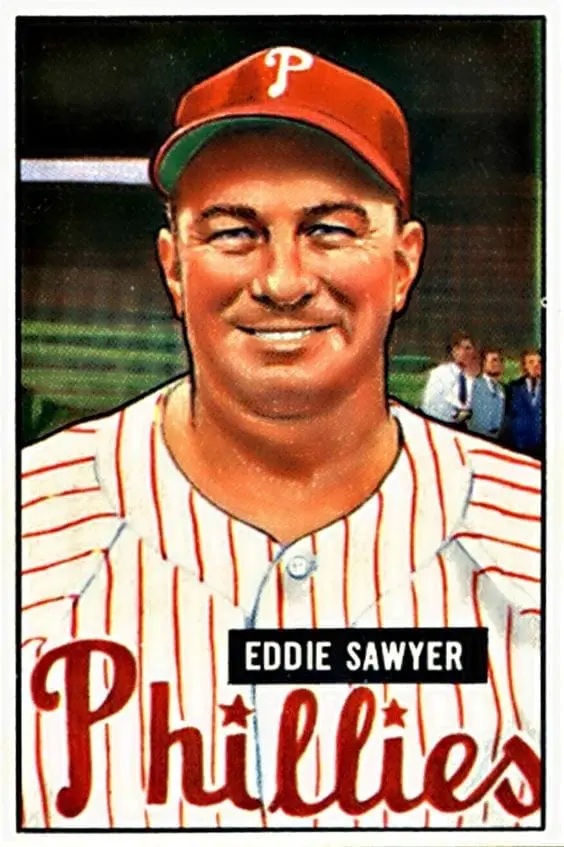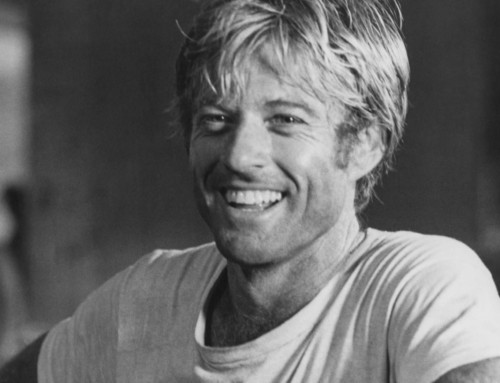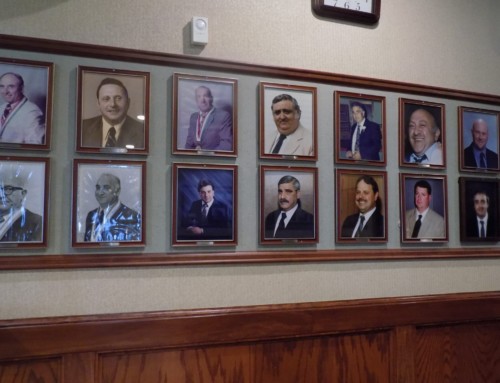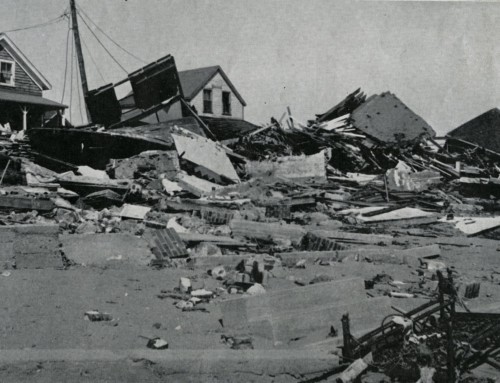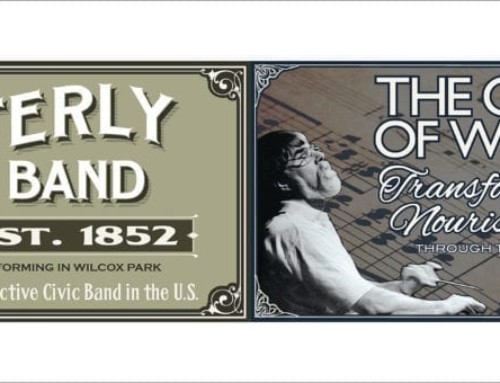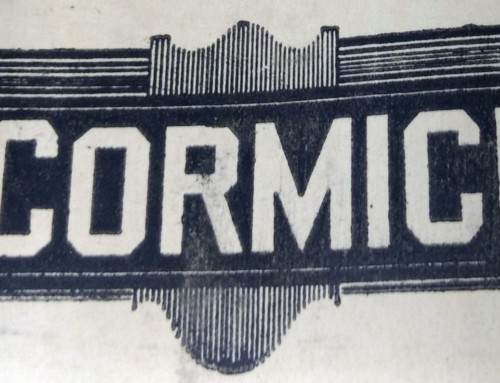If you haven’t already, head back to part 1 of these two-part series to read about Eddie Sawyer’s early years.
In July 1948, the Philadelphia Phillies were floundering, sitting firmly in seventh place. The team fired manager Ben Chapman and promoted Sawyer to the major league position. In doing so, Eddie Sawyer became the league’s second youngest manager at 37 years old.[24] He would also simultaneously serve as the team’s third base coach, a rarity in the game.[25] Success was not immediate. In 1948 the Phillies went 23-40 under Sawyer and finished in sixth place, 25 ½ games out of first place.[26]
The 1949 season saw the Phillies make significant strides, finishing with a record of 81-73. While the team still finished in third place, it was their first winning season since 1932, and their highest finish since 1917, before six of the team’s eight position players had been born.[27] At the end of the season, after seeing his team’s performance, Eddie Sawyer vowed that the Phillies would win it all in 1950.[28]
Sawyer’s prophecy nearly proved to be true. In 1950, Sawyer’s Phillies, sporting his newly designed red pin-striped jerseys, finished 91-63-3 and took the National League pennant. The first-place finish did not come without drama. Although the Phillies did not relinquish their hold on first-place after July 25th, their lead in the National League was down to one game over the Dodgers, who they played in the final game of the season. If the Phillies lost, they would be forced to play a playoff series against the Dodgers. This situation did not come to pass, as the Phillies took the final game 4-1 in ten innings.[29] After winning the pennant, 30,000 fans met the team at the 30th Street railway platform.[30]
The Phillies had ended their season on a hitting slump and that slump extended through the playoffs, and ultimately lead to their World Series loss to the New York Yankees, Sawyer’s former employer. The series was a low-scoring affair, as no World Series up to that point had seen fewer runs scored than in 1950.[31] After the end of the series’ final game, it is said that Sawyer was the first man out of the dugout to congratulate the Yankees.[32] Despite the season’s disappointing end, Eddie Sawyer was named the 1950 Manager of the Year.[33] He was also named the Coach of the Year by the Rhode Island Association of Sportswriters and Sportscasters.[34]
Pride for the hometown hero was high in Westerly. On October 3, 1950, the Westerly Town Council issued a resolution of congratulations for winning the pennant and wished him luck in the World Series.[35] After the end of the 1950 baseball season, Eddie Sawyer returned to Westerly where he was given a hero’s welcome. The so-called ‘Eddie Sawyer Day,’ was held on January 8, 1951 and included a wide range of celebrations and ceremonies.
During one such ceremony, Sawyer was given the key to the town, which was carved out of light pink Westerly granite and inscribed “Westerly, R.I., 1951.”[36] Throughout the course of the day, Eddie “made a marathon whirl of all the public and parochial school houses in Westerly and Pawcatuck” speaking before more than 3,200 children.
Also included were lunch and dinner receptions, as well as a program held in the high school auditorium which was attended by more than 400 citizens and was broadcast on local radio stations. Sawyer did not come to the events alone, as two of his coaches and the Vice President of the Philadelphia Phillies were also in attendance, as were Eddie’s parents.[37]
A few months later, the Phillies opened up their 1951 season. Unfortunately, this season was not nearly as successful, and the team finished in fifth place with a record of 73-81. After the less than stellar campaign, Sawyer clamped down during Spring Training in 1952, proclaiming there would be “no wives, no automobiles, no golf, no gambling, no swimming, and a strict curfew.”[38]
Despite the coach’s new hardline stance, the Phillies wilted to a record of 28-35 by June 27. On that day, Sawyer resigned as manager of the Philadelphia Phillies (some sources suggest he was fired, but regardless, the split appears to have been mutual). Sawyer remained on the team’s payroll for the remainder of the year and he served as an advisor, evaluating the franchise’s farm system.[39]
After the 1952 season came to an end, there were rumors that he was to be considered to manage the Pittsburgh Pirates, but Sawyer denied these claims, saying he was done with baseball for good. This was a promise he seemed to keep, at least for the next several years. From 1953 to 1958, he worked as a salesman for a golf ball manufacturer, eventually being named the Vice President of Sales.[40]
In a shocking turn of events, Eddie Sawyer was once again named the manager of the Philadelphia Phillies in July 1958. Sawyer’s influence could not help the struggling team and they finished in last place with a record of 69-85.[41] The 1959 season followed a similar course, with the Phillies finishing in the basement once again at 64-90. Despite the team’s struggles, Sawyer was signed to a new contract on September 25, 1959, and seemed poised to continue on as the team’s manager for the foreseeable future.
The 1960 season opened with a Phillies loss to the Cincinnati Reds. After the game, Sawyer stepped down as manager, famously quipping “I am 49 years old and want to live to be 50.”[42] This would be the end of Sawyer’s final stint as a manager at any level. Sawyer finished his Major League career with a record of 390-423 (.480), placing him fifth all-time among Phillies managers (as of his death).[43]
Much like years past, Eddie Sawyer found it difficult to stay away from baseball for too long. In December 1962, he rejoined the Phillies as a scout. He held this position until 1966. In 1968, he was announced as a full-time scout for the newly created Kansas City Royals, who began play in 1969. Sawyer’s expertise paid off, and Kansas City was the most successful of the four teams that began play that year and the only one to not finish last in their division.[44] On January 1, 1974, Eddie Sawyer officially retired from baseball after four years as a scout for the Royals.
On October 14, 1980, Eddie Sawyer threw out the ceremonial first pitch at Veteran’s Stadium in Philadelphia, kicking off the 1980 World Series which would be the first ever won by the Phillies when they defeated (ironically) the Kansas City Royals. He then spent much of the 1990’s caring for his wife, Polly, who was often ill, and he routinely turned down speaking engagements around the country, preferring to stay out of the spotlight.[45]
On September 22, 1997, Eddie Sawyer died in Phoenixville, Pennsylvania at the age of 87. He was survived by his wife, two daughters, five grandchildren, and three great-grandchildren.[46] Sawyer’s legacy can be easily summarized by one of his well-known quotes: “Baseball gets in your blood. There’s more to working than just making money. What good is all the money in the world if you don’t enjoy yourself?”[47]
[su_accordion class=””] [su_spoiler title=”Footnotes” open=”no” style=”default” icon=”plus” anchor=”” class=””]
[24] SABR Biography.
[25] “Sawyer Upsets Durocher Theory That ‘Nice Guys Finish Last’”
[26] SABR Biography.
[27] Baseball Reference, Philadelphia Phillies 1950 Team Page.
[28] SABR Biography.
[29] SABR Biography.
[30] SABR Biography.
[31] SABR Biography.
[32] SABR Biography.
[33] “Eddie Sawyer, Phillie Pilot, Is Named ’50 Manager of the Year” Westerly Sun, 9 November 1950.
[34] “Sawyer to Get Trophy” Westerly Sun, 8 February 1951.
[35] “Sawyer’s Achievement Is Hailed In Resolution of Town Council” Westerly Sun, 3 October 1950.
[36] “Home Town Key” Westerly Sun, 15 December 1950.
[37] “Eddie Sawyer Honored by Home Town” Westerly Sun, 9 January 1951.
[38] SABR Biography.
[39] SABR Biography.
[40] SABR Biography.
[41] SABR Biography.
[42] SABR Biography.
[43] “Eddie Sawyer, 87, Manager of Phillies’ ‘Whiz Kids’ in 1950” Philadelphia Inquirer, 23 September 1997.
[44] Baseball Reference, 1969 MLB Season Standings, https://www.baseball-reference.com/leagues/MLB/1969-standings.shtml.
[45] SABR Biography.
[46] “Eddie Sawyer, 87, Manager of Phillies’ ‘Whiz Kids’ in 1950” Philadelphia Inquirer, 23 September 1997.
[47] SABR Biography.
[/su_spoiler] [/su_accordion]
